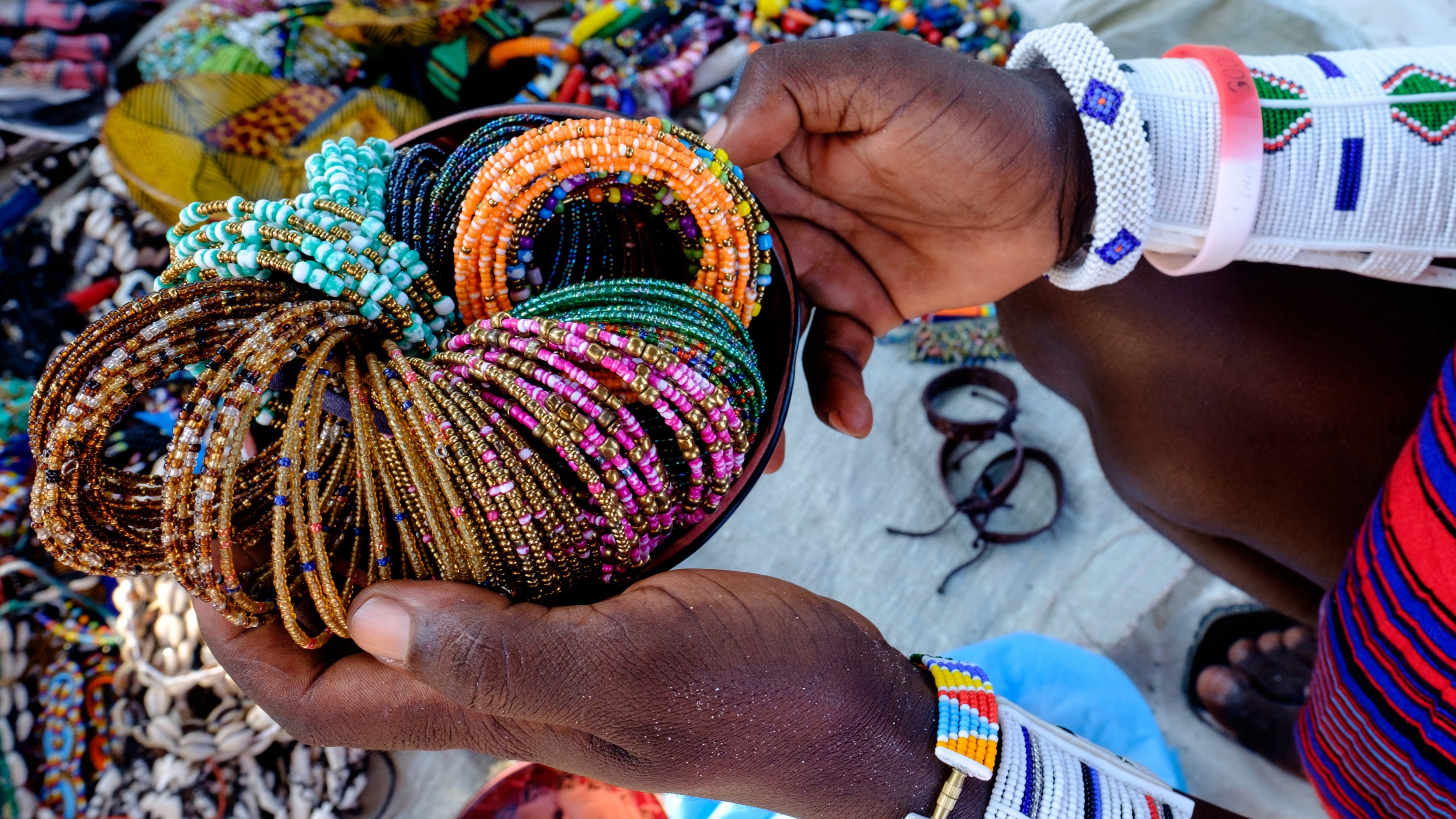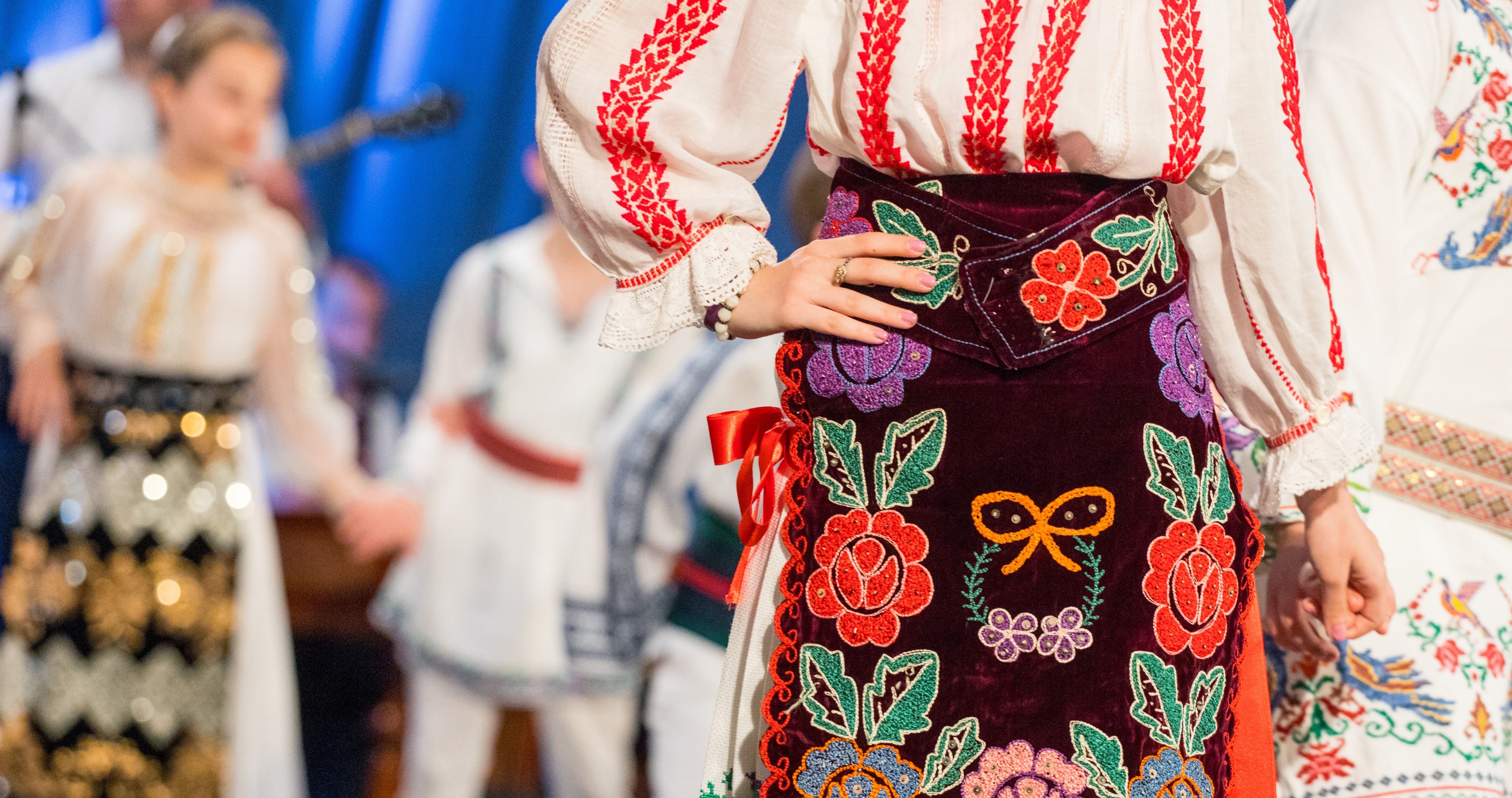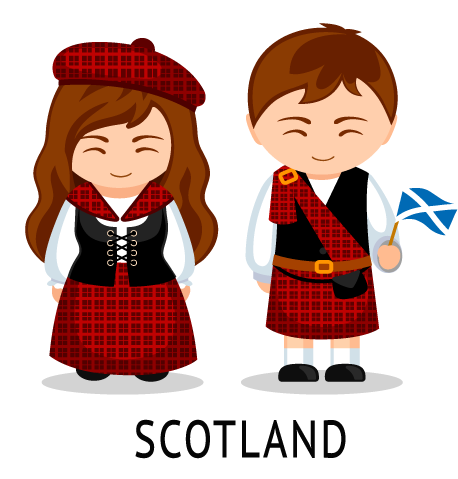
SCOTLAND
Kilt: a knee-length skirt-like garment made of tartan fabric, worn by men.
Tartan: a type of patterned cloth, often associated with Scotland and used for kilts and other traditional clothing items.
Sporran: a small pouch worn at the front of the kilt, used for carrying personal items.
Glengarry: a type of bonnet worn by men, usually made of wool and featuring a toorie (pom-pom) on top.
Balmoral: a type of bonnet worn by men, similar to the Glengarry but with a flat top and no toorie.
Tam o' Shanter: a type of bonnet worn by men, similar to the Balmoral but with a longer ribbon that hangs down the back.
Kilt hose: a type of thick, knitted sock worn with a kilt.
Kilt pin: a decorative pin worn on the front of a kilt to keep it in place.
Fly plaid: a large piece of tartan worn draped over the shoulder and fastened with a brooch, worn by men.
Sash: A long piece of cloth worn across the body, often made of tartan and worn by men
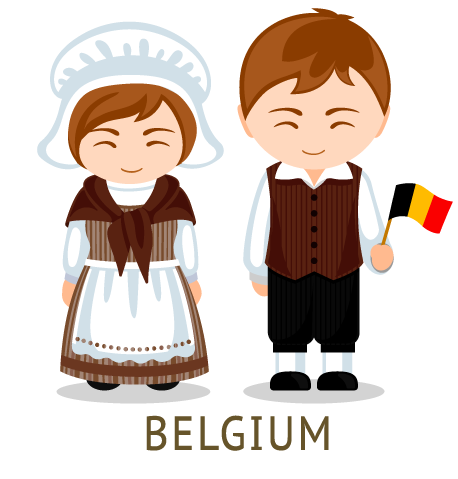
BELGIUM
Vlaamse kledij: This traditional clothing worn by men from Flanders region, which includes a jacket, trousers, and a traditional cap called a "petje."
Vlaamse klederdracht: This is the traditional clothing worn by women from Flanders, it includes a skirt, apron, and a headscarf.
Walloon costume: This traditional clothing worn by people from Wallonia region, which is less common but still worn during special occasions.
Brussels costume: This traditional clothing worn by people from Brussels region, which is also worn during special events, the costume is made of a jacket, trousers, and a traditional cap.
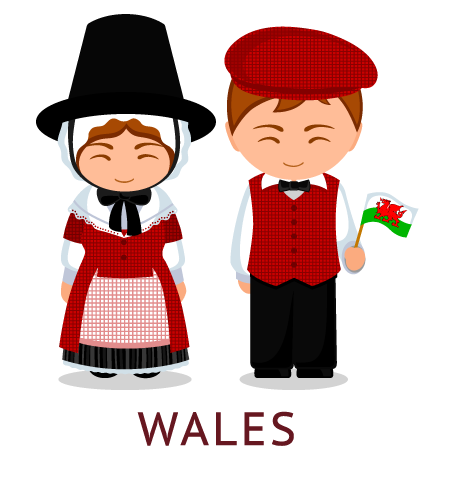
WALES
Coch banod: A traditional tall, conical hat made of wool or felt, typically adorned with a feather or ribbon.
Mantle or cwmni: a long, full-length cloak made of wool or other heavy fabric, typically fastened at the neck with a brooch.
Welsh dress: A traditional Welsh dress, also known as a "Welsh costume" is worn by women, it includes a long dress, shawl, and a tall, black hat.
Welsh suit: A traditional Welsh suit, worn by men, it's made of a jacket, trousers, waistcoat and a necktie, it's worn during formal events.
Welsh jacket: a traditional Welsh jacket worn by men and women, typically made from wool or tweed and characterized by its button-front design, and embroidered patterns.
Welsh shawl: a traditional Welsh shawl worn by men and women, typically made from wool or linen and characterized by its fringes and geometric patterns.
Welsh sweater: a traditional Welsh sweater worn by men and women, typically made from wool and characterized by its cable-knit patterns and natural cream colour.
.
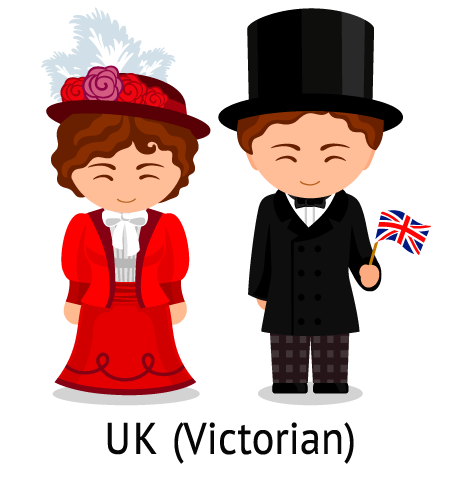
UK (VICTORIAN)
Crinoline: a traditional Victorian underskirt worn by women, typically made from horsehair or steel and characterized by its large, dome-shaped silhouette.
Victorian dress: a traditional Victorian dress worn by women, typically made from heavy fabrics such as silk, velvet, or taffeta and characterized by its long skirts, high necklines, and corsets.
Victorian corset: a traditional Victorian undergarment worn by women, typically made from cotton or whalebone and characterized by its tight-lacing and hourglass shape.
Victorian bonnet: a traditional Victorian headgear worn by women, typically made from straw, silk, or velvet and characterized by its large brim and decorative trim.
Victorian boots: traditional Victorian boots worn by men and women, typically made from leather and characterized by its ankle-high design and button closures.
Victorian suit: traditional Victorian suit worn by men, typically made from wool or tweed and characterized by its long coat, waistcoat, and trousers.
Victorian top hat: traditional Victorian headgear worn by men, typically made from felt or silk and characterized by its tall, cylindrical shape and wide brim.
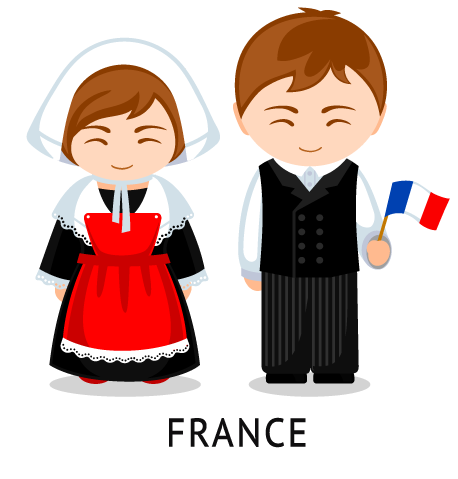
FRANCE
Beret: a traditional French headgear worn by men and women, typically made from wool and characterized by its flat top, and round shape.
Breton shirt: a traditional French shirt, typically made from cotton and characterized by its horizontal stripes and boat neckline.
.

SWITZERLAND
Dirndl: a traditional Swiss dress worn by women, typically made from cotton or linen and characterized by its full skirt, low-cut bodice, and apron.
Lederhosen: a traditional Swiss breeches worn by men, typically made from leather and characterized by its short, knee-length design and suspenders.
Trachten jacket: a traditional Swiss jacket worn by men, typically made from wool or loden and characterized by its button-front design, and embroidered patterns.
Trachten shirt: a traditional Swiss shirt worn by men and women, typically made from cotton or linen and characterized by its traditional collar and embroidered patterns.
Bundhosen: traditional Swiss breeches worn by men, typically made from wool or loden and characterized by its knee-length design and suspenders.
Trachten hat: traditional Swiss headgear worn by men and women, typically made from wool felt and characterized by its wide brim and feather decoration.
Trachten shoes: traditional Swiss shoes worn by men and women, typically made from leather and characterized by its low heel, pointed toe, and decorative buckles.
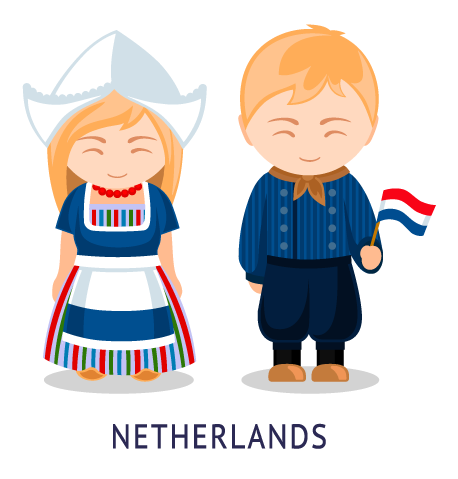
NETHERLANDS
Klompen: a traditional Dutch wooden shoe worn by men and women, typically made from willow or poplar wood and characterized by its thick sole and closed toe.
Klederdracht: a traditional costume worn by women in some parts of the Netherlands, particularly in the province of Friesland, consists of a long dress, apron, shawl, and headgear, typically worn on special occasions such as weddings and folk festivals.

AUSTRIA
Steirerkrapfen: traditional Austrian hat worn by men and women.
Dirndl: a traditional Austrian dress worn by women, typically made from cotton or linen and characterized by its full skirt, low-cut bodice, and apron.
Lederhosen: a traditional Austrian breech worn by men, typically made from leather and characterized by its short, knee-length design and suspenders.
Trachten jacket: a traditional Austrian jacket worn by men, typically made from wool or loden and characterized by its button-front design, and embroidered patterns.
Trachten shirt: a traditional Austrian shirt worn by men and women, typically made from cotton or linen and characterized by its traditional collar and embroidered patterns.
Bundhosen: traditional Austrian breeches worn by men, typically made from wool or loden and characterized by its knee-length design and suspenders.
Trachten hat: traditional Austrian headgear worn by men and women, typically made from wool felt and characterized by its wide brim and feather decoration.
Trachten shoes: traditional Austrian shoes worn by men and women, typically made from leather and characterized by its low heel, pointed toe, and decorative buckles.
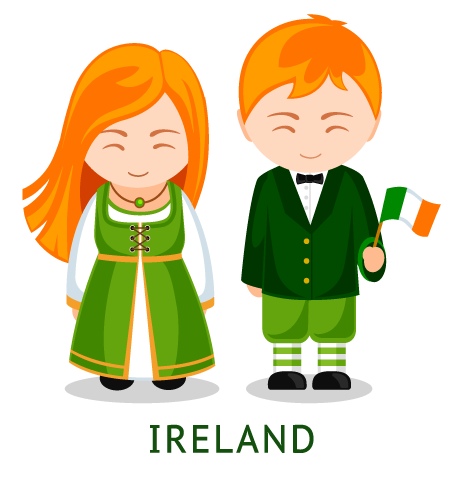
IRELAND
Aran sweater: a traditional Irish sweater, typically made from wool and characterized by its cable-knit patterns and natural cream colour.
Claddagh ring: a traditional Irish ring, typically made of gold or silver and characterized by its two hands holding a heart, with a crown on top, representing love, loyalty and friendship.
Kilt: a traditional Scottish garment worn in Ireland as well, typically made from wool and characterized by its knee-length skirt, pleats and tartan pattern.
Tweed jacket: a traditional jacket made of tweed fabric, worn by men and women in Ireland, typically in earthy tones and characterized by its rough texture and durability
Irish cap: a traditional men's headgear worn in Ireland, typically made of wool or tweed and characterized by its flat top, and curved visor.
Irish brogue: a traditional men's shoe worn in Ireland, typically made of leather and characterized by its intricate perforations and wingtip design.
Celtic knot: a traditional Irish symbol representing eternity, typically seen in jewelry, clothing, and home decor
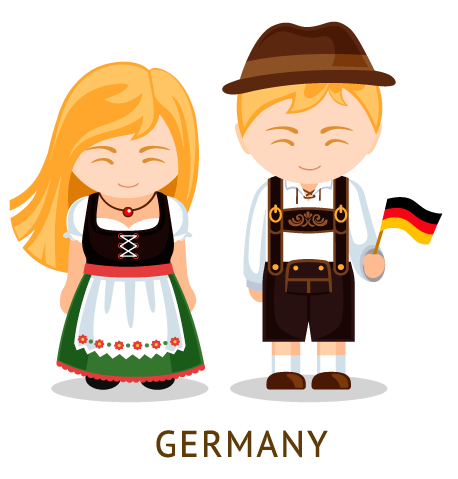
GERMANY
Dirndl: a traditional German dress worn by women, typically made from cotton or linen and characterized by its full skirt, low-cut bodice, and apron.
Lederhosen: a traditional German breech worn by men, typically made from leather and characterized by its short, knee-length design and suspenders.
Trachten jacket: a traditional German jacket worn by men, typically made from wool or loden and characterized by its button-front design, and embroidered patterns.
Trachten shirt: a traditional German shirt worn by men and women, typically made from cotton or linen and characterized by its traditional collar and embroidered patterns.
Bundhosen: traditional German breeches worn by men, typically made from wool or loden and characterized by its knee-length design and suspenders.
Trachten hat: traditional German headgear worn by men and women, typically made from wool felt and characterized by its wide brim and feather decoration.
Trachten shoes: traditional German shoes worn by men and women, typically made from leather and characterized by its low heel, pointed toe and decorative buckles.
Trachten jacket: traditional German jacket worn by men, typically made from wool or loden.
